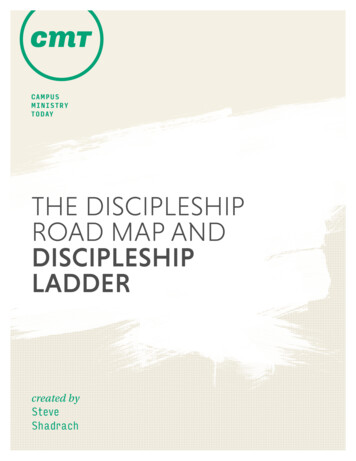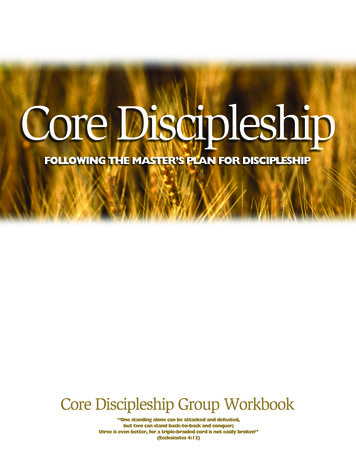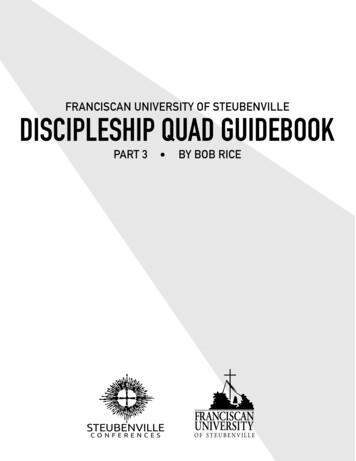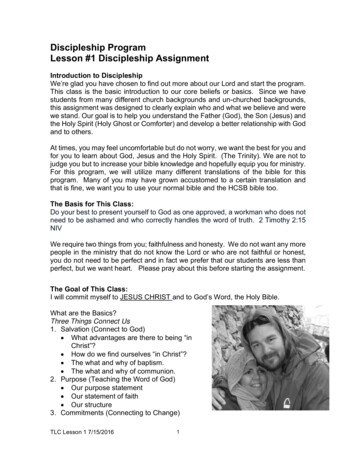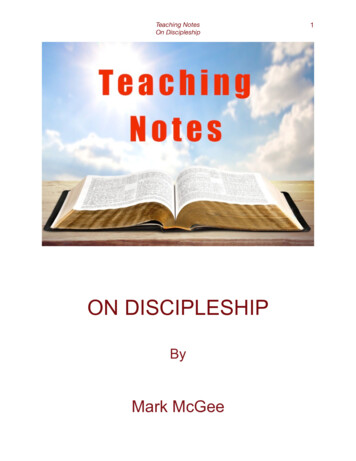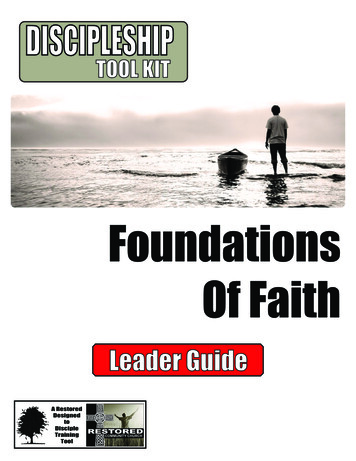
Transcription
DISCIPLESHIPTOOL KITFoundationsOf FaithLeader GuideA RestoredDesignedtoDiscipleTrainingTool
Foundations of FaithDiscipleship LessonsTrainer’s guideVision for the lessonsThese seven discipleship lessons are a tool or “wineskin” for disciple-makers in order to lay a biblical and reproducible foundation offaith in a new or ungrounded disciple.Purpose of the LessonsLesson One: To review the gospel message, to find assurance of salvation, and to equip the disciple in knowing and sharing the Stepsto Peace with God including 6 memorized scriptures, the bridge illustration, and their testimony.Lesson Two: To equip the disciple to pray, to read & to obey the Bible, and to begin a devotional life.Lesson Three: To explain God’s purpose for the church and to encourage active participation.Lesson Four: To encounter and embrace the perfect, Father heart of GodLesson Five: To introduce the disciple to the person, work and baptism of the Holy Spirit.Lesson Six: To lay a foundation for ongoing Christ-like growth through victory over sin, obedience and love.Lesson Seven: To motivate the disciple to life-long participation in the Great Commission.The ProcessLife on Life: These lessons are designed to be used in one on one or small group conversation. Don’t look at it as a workbook.Rather look at it as a discussion guide.Self-discovery: The lessons are designed to let the scriptures teach the disciple. Let them seek on their own to understand andcommunicate what the scripture says. The trainer’s role is to clarify and teach as needed to ensure accurateunderstandingReproducing: Cast vision from the very beginning that you expect them to be able to train someone else in the lesson when theyare finished. They will need to take notes in a way that will help them to remember and reproduce the lesson.Practice:As time allows, let them repeat a story or explain a section to ensure that they have caught it.Obedience:At the end of each lesson is a box entitled, “Your Response This Week”. Review these with the disciple at the endof the lesson and encourage them to follow them. Our goal here is not just to retain information but to obey all wehear.Accountability: At the beginning of each lesson, ask them if they followed through with the assignments for the week. If they didnot, encourage them with the importance of obedience and follow through. Set realistic but challenging goals withone another and agree to be accountable.Keep in mind Some lessons have several sentences of written text. A trainer can either have the disciple read it to themselves or they canread out loud together. Have them explain it in their own words. Instruct as needed and give them an opportunity to askquestions. Note: This will be particularly important on the baptism of the Holy Spirit on lesson five because this topic is verydifficult to capture in just 2-3 verses.The trainer should be familiar with the stories in a lesson before beginning. Recommended stories are provided, but a trainermay substitute their own story as long as it is reproducible.Scriptures in italics are optional during the lesson. The disciple can look them up on their own or if they have a question.
Frequently Asked Questions (FAQs)What are these lessons for?These lessons are intended to a lay a firm foundation in the life of a new believer as well as provide a simple reproducible tool fordisciple-makers. The first lesson is a review of the gospel. Some may discover that they are not a believer. Our hope is that everyonein our church would be equipped to use the simple Steps to Peace with God and their testimony to lead someone to the Lord as ourprimary evangelism tool. These lessons are the initial follow up, discipleship tool. There will be a challenge each week to share thegospel with at least 2 people and teach the lesson with someone else that may be ready to go through it.Taking someone through a lesson is not really my style. Do I have to use these?We are encouraging everyone to use these lessons, even if it’s not your normal style. We believe there will be tremendous benefits inhaving something that is simple and reproducible for everyone. We are realizing that the mark of true discipleship is not only personalgrowth but also helping generations of others to grow. These lessons can allow generations to pass down spiritual truths in a simpleway easy enough for anyone to do. We do encourage you to incorporate your own style into these lessons while still using the contentof the lessons as your template.Do I have to use the stories you give us?These are simply suggestions if you don’t have any stories of your own to use. We tried to pick stories that are easy for people torelate to and easy to share, but if you have a better story, feel free to use it! (Recommended stories are at the end of this trainer guide)What do I do if someone I meet with does not want to do them?If you meet someone who doesn’t want to do the lessons, then simply move on to someone who is interested and open. We’re awarethat not everyone will be responsive to the Lord (Luke 8, story of the seed and the sower).Am I supposed to teach these lessons or let the person just work through it on their own?The interpersonal relationship you develop with people as you take them through the lessons is absolutely necessary in order for thisto work. This is why we’re asking everyone to go through it with a trainer; we don’t want anybody to do it alone. It’s even morehelpful if you’re able to go through it with a small group of 3-4 people. Our goal is to obey the great commission by teaching othersto “observe all that [Jesus] commanded.” This will include instruction that leads to more self-discovery from the scriptures.What if I don’t have someone to take through the lessons?Talk with your Lifegroup or section leader and let them know. There may be a need there. We also encourage you to actively sharethe gospel. As you sow widely, you will invariably come across new or young believers to take through these lessons.Can these lessons be used with people of different cultures?Yes, that’s our hope. We designed the lessons so that they can be easily used cross-culturally. Stories and illustrations can be differentbut the principles will translate to any language. We recommend that you learn them now so that you will be prepared wherever youmake disciples.The lessons seem pretty basic. Does everyone have to go through it? Do I have to do it with someone else?We are asking everyone to go through these lessons. Successful discipleship is not only knowing the material yourself, but being ableto pass it along to someone else. 2 Timothy 2:2 says, “And the things you have heard me say in the presence of many witnesses entrustto reliable men who will also be qualified to teach others.” This is the heart behind our desire to have everyone do these lessons. Theway for these spiritual truths to take root in your life is to not only hear them but to transfer them to others. Some say that on average,we remember 20% of what we just hear but 80% of what we both hear and teach.I notice that there is lots of accountability in these lessons. Why?As children of God, the way we change is by having other people in our lives who are helping us move forward in our relationshipwith God. Accountability is important because we want you to pass the lessons on to others, and being accountable helps this happen.We all know that we often struggle in reaching our goals, and walking with others helps us keep pressing forward.I feel uncomfortable with the idea that “I know more than someone else” I am supposed to “disciple”. Howdo I take a friend or peer through these lessons?Discipling someone who has been a believer for a while may seem awkward. Yet our conviction is that everyone needs someone elseto take initiative in their life. Many “mature” believers have no idea how to disciple someone in a simple, reproducible way. Webelieve these lessons will be a helpful review for many but a critical tool for everyone who desires to obey the great commission. Ifyou are meeting with someone you consider a peer in the Lord, then treat them like a friend. Invite them into a relationship where youcan sharpen each other. Ask them if they are okay with you taking the initial lead. This can often be an indicator of whether or notsomeone is teachable, wanting to grow and willing to be accountable. Lastly, focus your energy on the hungry. Someone hungry forGod will want to learn from anyone.
Foundations of FaithLesson One: Assurance of SalvationSteps to Peace with God1. God’s Purpose: Peace and LifeRead the following verses and describe in your own words God’s original intention for us.Genesis 1:27-28to bless us and give us a purpose; to be like him and multiply all over the earth (glorify Him)John 3:16 (memorize)not to perish but to have eternal lifeJohn 10:10 (memorize)To have a full and abundant lifeThere is a God. He is real. He exists. God is not nature or the creation of man. God is our creator. That means you are not here byaccident. God made you to bless you and give you a purpose. He wants you to experience peace and life – both eternal and abundant.2. The Problem: Separation from GodRead the following verses and describe in your own words sin and its resultsRomans 3: 23 (memorize)Everyone has sinned; Everyone fails to meet God’s standard and purpose for their livesRomans 6:23 (memorize)We all deserve deathIsaiah 59:2Sin has separated us from GodHave you ever sinned? YesNoI don’t know(see Exodus 20:1-17)The Bridge IllustrationStory on sin and our need for GodWhich statement best describes what you believe? What is wrong with the others?a. I have made a few mistakes, but mostly I am still a good person.b. A loving God wouldn’t send anyone to hell – just really evil people.c. I have sinned against God, so I deserve death and eternal separation from God.(See 2 Thessalonians 1:8-9)What are some ways people try to get to God? Why do they fail? Good works;Moralityreligion; philosophy; We can’t get to God on our own; we can’t be good enough3. God’s Bridge: the Cross!Read the following verses and describe in your own words what God has done for us.John 14:6 (memorize)Jesus is the only way to God in heavenRomans 5:8 (memorize)Jesus died on the cross for our sins1 Peter 3:18 Jesus diedEphesians 2:8-9for sins to bring us to GodGod saves us from our sin by grace through faith; good works don’t get us to heaven
Story on grace4. Our Response: Receive JesusRead the following verse and describe in your own words what we must do to receive God’s offer of salvation.Romans 10:9 (memorize)Confess Jesus as Lord of your life; and believe in his death and resurrectionCheck the responses necessary for you to be saved. (see also 1 John 1:9; Acts 2:37-39; I Corinthians 15:1-5; John 1:12)X Be willing to turn from your sinsDo more good things than bad thingsX Believe Jesus died to forgive your sins and rose from the deadX Admit that you have sinnedSincerely try to be a better personChoose one of the many ways to get to heavenGo to church moreX Invite Jesus to come in and control your lifeNew life in Christ!What can we learn from these verses about what a true Christian is?2 Corinthians 5:14-15, 17 a new creation; one who no longer lives for themselves, but for God; convinced Jesus die for allI John 5:12-13Someone who accepts Jesus and believes in himCheck the statements that describe your new life in God.inner peacejoy having been forgivensense of God’s presencedesire to do God’s willconfidence that I will go to heavenawareness of sin in my lifefeeling of unconditional lovedesire to read the BibleHave you believed in Jesus and received this new life? Yes NoDescribe your life in the following boxes:My life before Jesusability to defeat sin in my lifedesire to share Jesus with othersnew love and concern for othersI don’t knowWhen I encountered JesusSince I encountered JesusYOUR RESPONSE THIS WEEK: Pray to receive Jesus into your life. Record your spiritual “birthday” here:On (month) (day) (year) I received Jesus into my heart to be my savior. He forgave my sin, became my Lordand took control of my life. Now I have become a child of God and a new creation. I have begun a new life.Signature: Talk with your trainer or a pastor about being baptized. (Acts 2:37-39; Romans 6:1-14)Get your own Bible if you do not have one. Begin reading the book of Matthew. Begin to do everything that Jesus commands.Memorize the steps to peace with God with the scriptures (in bold) and the bridge illustration.Practice sharing your testimony.Plan to attend a lifegroup.Agree with the one taking you through this lesson on a realistic but challenging goal to share the gospel this week.Share this lesson with someone who is ready to be trained.
Foundations of FaithLesson Two: Devotional LifeGod wants to spend time with you! One of God’s deepest desires is for you to know Him and have fellowship withHim. We can pray at any time of the day and at any place. God is everywhere and wants to be involved in every part of your life.Yet to really have a relationship with a person, you need to have consistent contact with that person. In the same way, if you want tohave a close relationship with God, you need to set daily time just for God. This “set apart” time for seeking God is our devotion life.Read Psalm 27:4, 7-8. Describe the attitude this person has toward seeking God.passion for God;Seeking is their highest priority;Determination to seek GodRead Jeremiah 29:11-13. What does God promise us in these verses?God will listen when we pray;Read Mark 1:35. What can we learn from Jesus?God can be found;Hope and prosperous future;That we will find him when we seek himIt’s good to find a place alone to pray early in the morningPersonal testimony on when and how you started spending time with GodGod hears us when we pray!Prayer is “talking” with God. We can communicate with God in the same way we canwith any other person. Prayer should be natural conversation with God. When you pray you should be honest and sincere. We don’thave to pray perfectly. Be encouraged - Jesus taught His disciples how to pray, and He will teach you too.*Read the following verses and write in your own words the type of prayer describedPsalm 135:3Praise celebrating who God is1 John 1:9Confession acknowledging your sins before God and repenting1 Timothy 2:1Intercession Asking God to meet the needs of othersPhilippians 4:6-7 Petitions Asking God to meet for your own need; Thanksgiving gratitude for what God has doneEffective prayer includes Having faithConfessing our sinsAsking according to His willAsking in Jesus’ namePraying with perseveranceVerse“But when he asks, he must believe and not doubt ” (James 1:6)“If we confess our sins.“.if we ask anything according to His will, He hears us.” (1 John 5:14)“And I will do whatever you ask in my name ” (John 14:13)“That they should always pray and not give up.” (Luke 18:1)Story on the power of answered prayer
God wants to speak to us through His Word – the Bible.God speaks to us in a variety of ways. Yet every potential truth about God and the world is subject to the authority of the Bible. TheBible was written over a 1500 year span by over forty authors in three languages. It records over 1000 references to fulfilledprophecies and an eyewitness account of a supernatural miracle of God in most of its 66 books. The Bible is regarded as the mostreliable text of any piece literature ever. It has been translated into other languages more than any other book. And for 2000 yearscountless lives have been transformed by its message. The Bible is God’s Word to us. He said perfectly what He wanted to saythrough imperfect people. He speaks to us through His Word today.*Match the verse and the correct truth about the Bible.B 1. Psalm 119:89-91C 2. Psalm 119:160 (Hebrews 4:12-13)D 3. 2 Timothy 3:15-17 (see Psalm 19:1-7)A 4. John 5:39-40 (see Luke 24:27, 44-45)a.b.c.d.The Scriptures should lead us to a relationship with Jesus.God’s Word is eternal and, therefore, relevant to us today.God’s Word is true - our moral standard of right and wrong.All Scripture is from God, powerful and useful to transform lives.What do you believe about the Bible?Below are three simple questions to ask yourself when you are reading the Bible.Read this story from Luke 10:38-42 and answer the following questions.What does this passage say?How does this apply to me?What should I do to obey God’sWord?How to get started with your devotional life1.2.3.4.5.Prepare for God – Find a time where you can consistently meet with God. Choose a place where you can meet with Godwithout being disturbed. Collect items you may need for your time with God: a Bible, journal, pen, music and a calendar.Worship God – Sing songs of praise to God. Thank God for something good in your life. (Psalm 100; Romans 12:1-2)Bible reading – Choose a book in the Bible to study using the three simple questions above. If you have never read the Biblebefore, begin with the gospel of Matthew. Consider how what you read applies to your life and obey everything Jesus says to do.Prayer - Share your concerns for yourself and others with God through prayer.Wait on God – Listen for His encouragement, correction and direction. Write down what you sense God saying to you in ajournal. (Psalm 143:8)Make it a part of your daily routine. It is your decision to meet with God. Spending time with God will not make God love you more,but if you seek God everyday, you will grow in your love for Him and obedience to Him. (Matthew 6:33)*Will you commit to a daily devotional life with God?SignatureYOUR RESPONSE THIS WEEK: Decide when and where you will set aside time alone to spend time with God every day and begin! Get a journal and make a list of things you want to pray about. Spend time with God together with the one taking you through this lesson. Agree with the one taking you through this lesson on a realistic but challenging goal to share the gospel this week. Share these lessons with someone who is ready to be trained.
Foundations of FaithLesson Three: The ChurchCreated for CommunityRead Genesis 2:18. In God’s perfect creation before any sin, what did God say was “not good”? Why?For man (people) to be alone; People need help; He created us for communityStory on our need for community and acceptanceOne of the greatest needs of the human heart is relationship. When you became a child of God, you became a member of God’sfamily, the church. The church is not just a building or a meeting. The church is a gathered group of believers. We were created forthis kind of community. We all need God, and we all need the church to find acceptance and fulfill His plans for our lives. Jesus andthe church are inseparable.Read Ephesians 1:22-23. What do these verses teach us about the church? Jesusis the head of the church; Thechurch is describes as Christ’s body, fellow citizens, God’s household (family), a building in the process ofbeing built, the temple of God (where his presence dwells)Read Hebrews 10:24-25. What do these verses tell us is God’s will for us regarding being with other believers regularly?We need to meet regularly to spur each other on and to encourage one anotherDescribe in a couple words your past view and experience of the church.Personal testimony on what the church has meant in your lifeChurch lifeThe best description of church life in the New Testament is more of a series of snapshots than a definition. Numerous passages help ussee what Jesus intended for His body, the church.Read Acts 2:42-47 and circle the activities and experiences that characterized the early church.v. 42 - They were continually devoting themselves to the apostles’ teaching and to fellowship, to the breaking of bread and to prayer.v. 43 - And everyone kept feeling a sense of awe; and many wonders and signs were taking place through the apostles.v. 44 - And all those who had believed were together and had all things in common;v. 45 - and they began selling their property and possessions and were sharing them with all, as anyone might have need.v. 46 - And day by day continuing with one mind in the temple, and breaking bread from house to house, they were taking their meals together withgladness and sincerity of heart,v. 47 - praising God and having favor with all the people. And the Lord was adding to their number day by day those who were being saved.”What would attract you to this type of community?Purpose of the ChurchRead Ephesians 3:10-11, 20-21. What is God’s purpose for the church? ToTo glorify Godreveal His wisdom to the world;
Read Matthew 28:19-20. Describe the four things Jesus commands His followers to do in these verses in your own words.To“go” to another person with the gospel; take the initiative; even to the nations, Lead other people to follow Jesus(make disciples), Baptism them with water when they choose to believe, Teach them to know and obey all JesuscommandedActs of ObedienceJesus has instructed us to obey all that he has commanded. Baptism, the observance of the Lord’s Supper and giving are three specificcommands Jesus gave us that demonstrate our relationship and commitment to other believers.BaptismWater baptism is a public declaration that you believe in Jesus. Baptism is not optional but the first command Jesus has given newbelievers (Acts 2:38). Water baptism is a symbolic act through emersion in water. It does not have the power to forgive sin. Butbaptism does signify to the world, “I am not ashamed to identify with Jesus Christ or His family.”Read Romans 6:3-4. What does water baptism symbolize according to these verses?Our death to sin and new life in ChristThe Lord’s SupperRead 1 Corinthians 11:23-26. According to these verses what has Jesus instructed his disciples to do? Why?Eating thebread and drinking the cup to symbolize his death as a way to remember his death and proclaim himWe call this ordinance from Jesus the Lord’s Supper. It ought to be regularly observed wherever and whenever the people of God aregathered. When we receive the Lord’s Supper, it is a time to examine our actions and faith (1 Corinthians 11:27-29), to rememberwhat He has done for us on the cross and renew our covenant of love together with Him.GivingGod also asks the church to be a giving community. Monetary giving is often a test of the disciple’s faith, love and obedience.Everything we have is from God, and He is our provider. We can trust Him with our money and our lives.What do the following verses teach us about giving?Malachi 3:8-10We should not rob God by holding back tithes (10% of our income) and offerings2 Corinthians 9:6-8God wants us to give generously, willingly and cheerfully;Acts 20:35it is more blessed to give than to receivePersonal testimony of blessing from givingYOUR RESPONSE THIS WEEK: Commit to a lifegroup and Sunday morning attendance. Begin this month giving 10% of your income to a local church or group of believers. Agree with the one taking you through this lesson on a realistic but challenging goal to share the gospel this week. Share these lessons with someone who is ready to be trained.Foundations of Faith
Lesson Four: God our FatherOur FatherGod can be described in a lot of ways. He is our creator and savior. He is holy, loving and all-powerful. In the New Testament, wecome to know Him as Father, Jesus and Holy Spirit. When Jesus came he showed us what the Father is like and how to have arelationship with Him. He also taught His disciples to address God in prayer saying, “Our Father who art in heaven.” When youcome to faith in Jesus, you are adopted into God’s family (Romans 8:15). God becomes your father.Story on the need for a FatherWe all have an earthly father. Like it or not our relationship (or lack of relationship) with our earthly father has significantly shapedthe way we each view God as our heavenly Father for good or for bad.Check the words below that best describe your earthly father.Distant and disinterestedSlow to angerKind and compassionateImpatient and harshPassive and coldToo busy for meNever pleasedFaithful to protect and provideWarm and acceptingDisciplines because he loves meWants to help meCondemning and unforgivingFull of grace when I failLet’s me do whatever I wantUnconditionally loves meIn what ways do you believe God is like your earthly father?Our Father’s GoodnessRead Matthew 7:7-11. What does this verse teach about God?He is so good and He gives better gifts than ourearthly fatherRead Daniel 3:13-28. What do these verses teach us about God’s protection of us?God is trustworthy whether he protects us or not; God can protect us miraculously; God is with us in trialsRead Matthew 6:31-34. Why are God’s children not to worry?God, the Father knows our needs and will provideStory on God’s provisionOur Father’s LoveRead Luke 15:11-24. What are the similarities between this father and God the Father?He is generous; patient;gracious; The father eagerly longed for his son to come home; He was quick to show acceptance, mercy andforgive; He celebrates his childrenRead Hebrews 12:5-11.Why does God discipline us?For our good; To make us holyWhat are the results of God’s discipline? Holiness,righteousness and peace
Read Romans 8:31-39. Describe the love of God in your own words.It is so great. Nothing can separate us fromhis love.How has God revealed His love to you? Please write an example below.Story on the love of GodYOUR RESPONSE THIS WEEK: Share with the one taking you through this lesson any painful memories of your relationship with your earthly father. Pray the following prayer: “God, I believe you are my perfect Father. I choose to believe what the Bible says about you ratherthan my experiences. Open the eyes of my heart to see you more clearly as you really are.” Agree with the one taking you through this lesson on a realistic but challenging goal to share the gospel this week. Share these lessons with someone who is ready to be trained.
Foundations of FaithLesson Five: the Holy SpiritWho is the Holy Spirit?You are not alone. Jesus promised us before He left that He would always be with us (Matthew 28:20). So if Jesus has ascended intoheaven and has not retuned yet how can God always be with us? The Holy Spirit is God (2 Corinthians 3:17). Jesus is God in theform of a man. He can only be one place at a time. Right now He is in heaven. But God is always with us by His Spirit. When wefeel God’s presence or hear God’s voice – that is the Holy Spirit!Have you ever experienced the presence of God? When?Story on experiencing the presence of GodSealing of the Holy SpiritRead Ephesians 1:13-14. What happen when you first believed the gospel?We were sealed with the Holy Spiritguaranteeing our inheritanceWhen you received Jesus into your life the Holy Spirit came to live in you. The Holy Spirit dwells in and with every believer forJesus. The Holy Spirit is like a seal on our lives securing us for God and our inheritance in heaven. The Holy Spirit is always with usworking in our lives.What does the Holy Spirit do?Read these verses and describe the activity of the Holy Spirit.John 14:26Be our counselor; Teach and remind us of everything Jesus saidJohn 16:8, 12-15Convict us of sin, righteousness and judgment; Guide us into all truth; Glorify JesusRomans 5:5Puts love in our heartsRomans 8:26-27 Helpsus in our weakness; prays for us and helps us to prayFruit of the SpiritThe Holy Spirit also works in our lives to make us like Jesus. Christ-like characteristics are described in the Bible as good fruit.Review the fruit of the Spirit in the verse below. Circle 2 or 3 you would like to see more in life this week.(Galatians 5:22-23)“the fruit of the spirit is love, joy, peace, patience, kindness, goodness, faithfulness, gentleness,Read John 15:1-8. How can we bear fruit?self-control.”We bear fruit by “remaining” in him and his word; Remaining in himmeans increasing conversation with Him and obedience to his will; Ask and it will be given to usStory on abiding in God
Baptism of the Holy SpiritComing upon in powerRead Acts 1:8. What does God say the Holy Spirit will do for us? Why? Givesus power to be his witnessesWe are “sealed within” by the Holy Spirit when we are saved, but the Holy Spirit also wants to “come upon” us in power. This iscalled the baptism of the Holy Spirit (Matthew 3:11, Acts 19:1-7) or “being continually filled” the Holy Spirit (Ephesians 5:18). Weneed the baptism of the Holy Spirit so that we can do the works that Jesus did, even greater ones (Acts 1:4-8; John 14:12; Hebrews2:4). The baptism of the Holy Spirit is a personal encounter with God that draws us close to Him and empowers us to glorify Him onearth. (Read Luke 3:20-22; 4:1, 14, 18-19 to see the baptism of the Holy Spirit and its effects in Jesus’ life.)Gifts of the SpiritThe Holy Spirit also gives us gifts to serve the church and extend the kingdom of God. These gifts are abilities that are supernaturallyempowered by God. Every believer in Jesus has at least one primary spiritual gift to contribute to the body of Christ.Read 1 Corinthians 12:4-11. (see also Romans 12:3-8 ; Ephesians 4:11-12 ) What did you learn about spiritual gifts?there are many gifts; each person is given at least one by God as he determines; they are given for the commongoodBaptism of the SpiritThe Baptism of the Holy Spirit occurs in a variety of ways throughout the New Testament. There is no one method for being baptizedwith the Holy Spirit. Neither is there only demonstration of the Spirit. The following are common, biblical characteristics of thosewho experience the baptism of the Holy Spirit.Receiving the Baptism of the Spirit includes VerseA desire for righteousness “those that hunger and thirst for righteousness will be filled.” (Matthew 5:6)A desire for spiritual gifts “eagerly desire spiritual gifts” (1 Corinthians 14:1)Confessin
These seven discipleship lessons are a tool or “wineskin” for disciple-makers in order to lay a biblical and reproducible foundation of faith in a new or ungrounded disciple. Purpose of the Lessons Lesson One: To review the gospel message, to find assurance of salvation, and t


